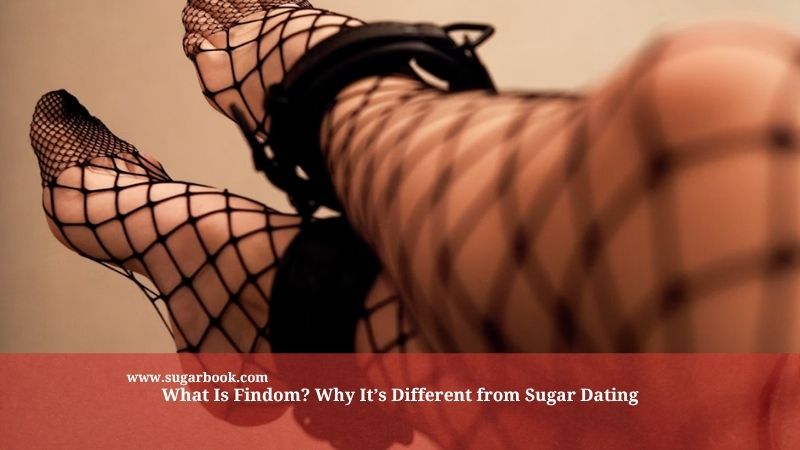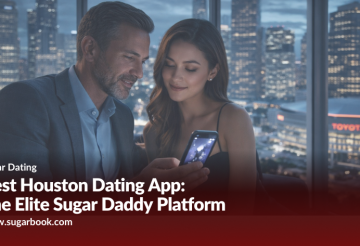
Meet successful sugar daddies and confident sugar babies on the world’s leading sugar dating app. Join free today.
Official 2026 Lifestyle Comparison (Updated January 2026): As premium dating boundaries expand in the United States, distinguishing between different financial and social dynamics is essential for a secure experience. This report analyzes the Sugar Daddy dynamic versus other specialized trends, focusing on honest & beneficial relationships.
Understanding the 2026 distinction between findom and a Sugar Daddy arrangement is vital for maintaining professional boundaries. While findom centers on control, Sugarbook prioritizes lifestyle support and traditional partnerships. Every agreed arrangement is established in a secure environment through mandatory face-verification and mutual professional respect.
Contents
- Distinguishing Premium Lifestyle Choices in the 2026 US Market
- What Is Findom?
- Origins and Evolution of Findom
- Common Dynamics and Roles in Findom
- Platforms and Tools Used in Findom Relationships
- How Findom Differs from Sugar Dating
- Consent and Expectations
- Financial Focus vs Emotional Bonds
- Power Exchange and Control
- Legal and Ethical Perspectives
- Is Findom Safe?
- Psychological Impacts of Findom
- Scams and Financial Exploitation Risks
- Guidelines for Safe Participation
- What Sugarbook Offers Instead
- Empowered Sugar Dating Model
- Transparent Expectations and Consent
- Relationship-Oriented Features on Sugarbook
- Findom vs Sugar Dating: Key Differences Summarized
- Why Education Matters in the Sugar Lifestyle
- Conclusion: Empowering Your Journey Through Informed Choices
- Sugar Daddy Websites vs Apps: Navigating 2026 Trends
- FAQ: Findom vs Sugar Dating Insights 2026
Distinguishing Premium Lifestyle Choices in the 2026 US Market
In the evolving landscape of high-caliber US connections, clarity regarding relationship dynamics has never been more important. For a discerning Sugar Daddy, the primary goal is establishing an honest & beneficial relationship built on mutual value. However, many new members often confuse this with other specialized trends, such as financial domination (findom).
The difference lies in the intention. On Sugarbook, we facilitate exclusive companionship where lifestyle support and professional mentorship are the standard. This stands in contrast to findom, which focuses on power-exchange and psychological control rather than a traditional partnership. Understanding this strategic relationship management is key to fostering a successful agreed arrangement.
In 2026, establishing a beneficial connection in the United States requires a platform that understands the importance of discreet matchmaking and verified trust. By prioritizing transparency, members can bypass the ambiguity of fringe trends and focus on building high-value, sustainable connections.
What Is Findom?
Financial domination, or “findom” is a kink-based arrangement where one person voluntarily gives up financial control to another in exchange for emotional satisfaction. The dominant, often referred to as a “findomme” or “findom,” commands, while the submissive – called a “paypig” , finds pleasure in being financially used.
This exchange isn’t rooted in love or romance, but in a consensual power imbalance where giving money becomes the core form of interaction.
Origins and Evolution of Findom
Findom started gaining attention through online BDSM and kink communities in the early 2000s. Originally, it thrived in chat rooms and adult forums and later moved onto cam sites, Twitter, and private fetish networks.
Unlike most traditional relationship models, findom rarely includes real-life meetups. Most relationships unfold entirely online, centered around financial tribute and control.
Common Dynamics and Roles in Findom
A typical findom arrangement involves:
-
FinDomme / FinDom – The person in control, receiving money or financial access.
-
Paypig / Cash Sub – The submissive who offers funds, gifts, or tributes.
Tributes can range from direct bank transfers to shopping sprees, Amazon wishlists, or even access to credit cards. The power exchange is key submissives are often aroused by the feeling of being financially drained.
Platforms and Tools Used in Findom Relationships
Findom relationships often flourish on platforms not built for dating but for kink and digital domination. Popular tools and platforms include:
-
Twitter (via hashtags like #findom, #cashpig)
-
Clip sites and adult cam platforms
-
Encrypted wallets (e.g., Bitcoin, Ethereum)
-
Peer-to-peer payment apps (Venmo, PayNow, etc.)
-
Messaging apps with pseudonym privacy
Because these setups are largely unmoderated, participants should always proceed with caution.
How Findom Differs from Sugar Dating
Understanding the difference between findom and sugar dating is crucial—especially when seeking meaningful, safe, and rewarding connections through platforms like Sugarbook.
Let’s compare the two:
Consent and Expectations
-
Findom: Consent is often implied or vague. There may be limited discussion of boundaries or terms.
-
Sugar Dating: Consent and boundaries are explicit. On Sugarbook, both sugar babies and sugar daddies agree on expectations upfront, leading to more secure, transparent experiences.
Financial Focus vs Emotional Bonds
-
Findom: Solely financial. There’s little to no emotional exchange. It’s about control, not companionship.
-
Sugar Dating: While money is involved, emotional connection, mentorship, and companionship are often equally valued.
Power Exchange and Control
-
Findom: One-sided. The dominant partner holds all the power.
-
Sugar Dating: More balanced. Both parties contribute to the relationship’s dynamic and success.
Legal and Ethical Perspectives
-
Findom: Legally grey. Without platforms or contracts, issues like blackmail and financial abuse can occur.
-
Sugar Dating: Platforms like Sugarbook emphasize ethical dating, transparency, and safety tools to reduce risk.
Is Findom Safe?
While some may view findom as empowering or thrilling, it can be emotionally and financially risky. Unlike sugar dating, where mutual satisfaction is the goal, findom sometimes edges toward emotional manipulation or financial addiction.
Psychological Impacts of Findom
For submissives, the risks may include:
-
Over-spending or financial ruin
-
Emotional dependency on the dominant
-
Mental health challenges like shame, anxiety, or addiction
For dominants, especially beginners, ethical boundaries can become blurry. The high of control may lead to exploitation, even unintentionally.
Scams and Financial Exploitation Risks
Not all findom “dominants” are real. Many are scammers who fake dominance just to siphon cash. Common scams include:
-
Phishing for bank or credit card info
-
Unconsented blackmail
-
Fake identity manipulation
-
Romance baiting under the guise of kink
Guidelines for Safe Participation
If you’re still curious about exploring findom safely, remember:
-
Never give full access to your banking or crypto accounts.
-
Set strict spending limits.
-
Use encrypted platforms or anonymous e-wallets.
-
Avoid unverified dominants.
-
Document your conversations and agreements.
What Sugarbook Offers Instead
Sugarbook.com offers a healthy, transparent alternative to risky findom arrangements. It’s a premium sugar dating platform designed for safety, empowerment, and agreed arrangement.
Here’s how it stands apart:
Empowered Sugar Dating Model
Unlike findom, sugar dating on Sugarbook involves open negotiation, aligned goals, and mutual consent. It’s not about domination—it’s about lifestyle choices and meaningful companionship.
Transparent Expectations and Consent
Each user on Sugarbook can:
-
Share income range and relationship preferences
-
Verify profiles and photos
-
Use privacy filters and safety tools
-
Access resources on healthy sugar dating
This transparency builds trust before any offline interaction occurs.
Relationship-Oriented Features on Sugarbook
-
Advanced filters for ideal matchmaking
-
Verified user profiles
-
Moderated messaging tools to prevent harassment or scams
-
Educational guides for sugar babies and sugar daddies alike
These features help users form relationships that are not only beneficial, but respectful, consensual, and secure.
Findom vs Sugar Dating: Key Differences Summarized
| Feature | Findom | Sugar Dating (e.g., Sugarbook) |
|---|---|---|
| Intent | Power exchange via money | Agreed arrangement connection |
| Consent | Often blurred or unspoken | Explicit and agreed |
| Emotional Connection | Rare or non-existent | Often prioritized |
| Safety | High risk of abuse or fraud | Safer, moderated platform |
| Platform Support | Unregulated adult/kink platforms | Verified community, like Sugarbook |
Why Education Matters in the Sugar Lifestyle
Confusing findom with sugar dating can lead to poor decisions, emotional harm, and financial risk. Educating yourself on these differences empowers you to engage with confidence, clarity, and consent.
Sugar dating—done right—is about empowerment, not exploitation.
Conclusion: Empowering Your Journey Through Informed Choices
While findom focus on psychological thrill and control, it carries significant risks for those seeking authentic connections. Without reciprocity or clear safeguards, those dynamics can often become unstable. In the 2026 US market, choosing a path rooted in transparency and mutual gain is the most sustainable way to experience lifestyle support.
Sugar dating, particularly through Sugarbook, offers a sophisticated alternative built on empowerment and connection. By prioritizing an honest & beneficial relationship, members ensure their strategic companionship is both rewarding and secure. Establish your Sugar Daddy in the US connection today with total clarity and control.
In a landscape dominated by mobile technology, it is natural to evaluate if traditional platforms still hold value. While apps top the charts, many members still utilize premium relationship platforms on desktop to manage complex agreed arrangements—especially within high-net-worth hubs in the United States.
The trend indicates that high-caliber members prefer a hybrid approach. Sugarbook continues to lead the industry by adapting its ecosystem for discreet matchmaking across all devices. Whether you are seeking a traditional partnership or professional mentorship, utilizing verified elite communities ensures your lifestyle elevation is handled with the highest level of privacy and sophistication.
💡 2026 Relationship Integrity Takeaways
- Intentionality Matters: Findom and sugar dating serve different purposes; understanding the strategic relationship goals is essential before engagement.
- Platform Standards: Sugarbook prioritizes honest & beneficial relationships and does not host transactional kink-based content.
- Security First: Every agreed arrangement on a high-authority platform is backed by mandatory face-verification.
- Reciprocal Value: 2026 US trends favor traditional partnerships that offer long-term professional mentorship and lifestyle support.
FAQ: Findom vs Sugar Dating Insights 2026
1. What defines findom within the modern dating landscape?
Findom, or financial domination, is a psychological dynamic centered on power exchange. Unlike an honest & beneficial relationship, it is often transactional and lacks the shared goals of a traditional partnership.
2. Is findom the same as a Sugar Daddy arrangement?
No. A Sugar Daddy arrangement in 2026 focuses on lifestyle support, companionship, and professional mentorship. Findom is rooted in control dynamics and often does not involve real-life connection.
3. Can a partner provide lifestyle support without engaging in findom?
Absolutely. Most members on Sugarbook seek a beneficial connection based on mutual respect and shared interests, establishing a traditional partnership rather than a power-exchange dynamic.
4. How does Sugarbook ensure the safety of its US members?
By utilizing discretionary privacy protocols and mandatory verification, Sugarbook creates a secure environment for establishing agreed arrangements that are transparent and respectful.
5. Does Sugarbook facilitate kink-based financial dynamics?
No. Sugarbook is a relationship-first platform focused on fostering high-caliber, honest & beneficial relationships. We do not support purely transactional or control-based kink dynamics.













